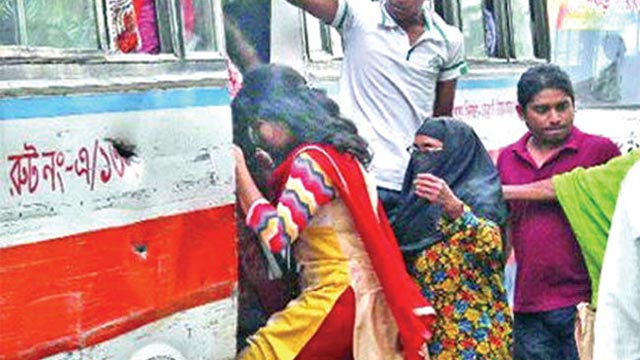Over 63 per cent adolescent girls and young women in Bangladesh capital Dhaka face different types of harassment in public transports, said a survey published on Friday.
Among the victims, 46.5 per cent experienced sexual harassment in these transports, said the survey conducted by Aachol Foundation.
The survey was conducted on 805 women aged between 13 years and 35 years from different schools, colleges, universities and companies from March to May in the ongoing year.
The samples were passengers of buses, trains, legunas and ridesharing services, said the foundation officials while publishing the report in a virtual programme.
According to the survey, 84.1 per cent sample women used buses as public transports. Besides, 4.58 per cent used trains, 3.27 per cent CNG-run auto-rickshaws and 1.53 per cent used ridesharing services.
The report shows that 63.4 per cent participants said that they had to face different types of harassment while travelling by public transports in the past six months.
Of the total victims, 46.5 per cent said that they had to face sexual harassment, 15.3 per cent bulling, 15.2 per cent social discrimination, 14.9 per cent gender discrimination and 8.2 per cent said that they had to experience body shaming in public transports.
Among the victims of sexual harassment, 75 per cent said they were harassed by other bus passengers followed by 20.4 per cent by the drivers’ assistants, 3 per cent by the hawkers and 1.6 per cent by the drivers.
They also said that in cases of perpetrators, the highest, 61.7 per cent, were aged between 40 and 59 years and 36.3 per cent aged between 13 and 39 years.
The report said that 32.8 per cent of the victims were sexually harassed during standing in crowd inside public transports and 34.8 per cent of them stayed silent after becoming sexually harassed and 20.4 per cent avoided public transports after such bitter experiences.
Only 4.2 per cent sought help from fellow passengers and 0.5 per cent sought legal actions.
In 36.9 per cent cases of sexual harassment, other passengers ignored the incident and, in 2 per cent cases other passengers supported the perpetrators.
Due to incidents of sexual harassment, 29.4 per cent women had fear about using public transports, 21.2 per cent became traumatised, 16.4 faced inferiority complex and 13.8 per cent became depressed.
The virtual programme was attended, among others, by the foundation founding chairman Tansen Rose and co-leader (research and analysis unit) Farzana Akter Laboni.





